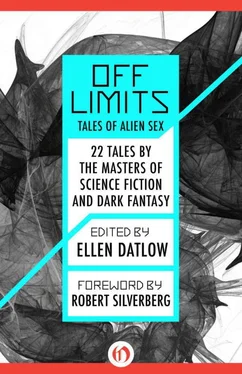Every night before she fell asleep, Harriet tried to imagine the total destruction of her own body. Flames would work, missiles or bombs. Stroke, angina, renal failure, poison in the bloodstream, plutonium in the water. Suns and planets might explode and take civilizations with them, or the dollar collapse so Americans couldn’t buy bread. Comets might arrive just like prophecies, and then the entire world would know. Harriet tried to imagine herself shot in the head by hasty addicts, or run over by blundering buses in the street. When the body died, the mind went someplace else, escaped this embrace of skin and politics and metal. Continents grew infirm, galaxies milky, teeth loose, philosophies abstract. If you were lucky and didn’t struggle, you might learn the pain that really mattered. You might even learn to be good. You might finally understand.
Sometimes the bleeding wouldn’t stop and Harriet visited the doctor.
“Do you do this to yourself?” he asked. He stood over her during the examination, exerting force and profession. “Or was it some boyfriend? Is it something you ask them to do or do they just go ahead and do it anyway?”
“I’m clumsy,” Harriet said, closing her eyes, seeing the white starry impact she saw whenever she contemplated herself. “It happens when I’m cooking at the stove, or chopping vegetables at the sink.”
Sometimes the doctors sat behind their desks and watched her from far away. They stopped looking at her body. They tried to look into another part of her.
“Why do you do it?”
“ I don’t really do it.”
“Is it because you don’t like yourself?”
“I like myself fine.”
“Have you ever been on medication? Have you ever visited a therapist?”
“I’ve consulted therapists,” Harriet said. “But I’ve never taken any prescribed medication.”
Then one day a man came along and tried to save her, a man Harriet consequently neither forgave nor forgot. Boyd Thomas left his wife and children, changed his job, and moved into Harriet’s apartment on a Superbowl Sunday, setting up a sort of provisional base camp on the living room sofa. Every day he went out for groceries and supplies from the local market. He did the chores, washed the dishes, and emptied the trash. Every evening he prepared large, nutritious dinner salads and vegetarian pastas in Harriet’s underequipped kitchen, and never even made a fuss when Harriet refused to eat. It was a type of cruelty Harriet had never known before. A man who wanted to take care of her. A man who wouldn’t go away.
Boyd assembled his dense, secret ministry of affection in Harriet’s life while Harriet wasn’t looking: new dishes, silverware, appliances, furniture, vitamins, consolation, and advice. Some mornings Harriet awoke to discover new curtains in the kitchen, tools and workbench in the basement, roses in a vase beside the stove, Boyd’s shoes under the sofa. “You need to get out more,” Boyd told her, arranging the dull clatter of tea things on an aluminum tray. “You need to stop feeling so sorry for yourself. Reenroll in school for chrissakes. Career Management—that’s what I was thinking. And look at me when I’m talking, why can’t you ever look at me? All I ever do is give, give, give, and all you ever do is take.”
Boyd could endure even more abuse than Harriet, and that’s why she couldn’t make him go away. He intercepted flying plates and glasses with ease, replacing them patiently on the shelves where Harriet could reach for them again. He entertained crude slurs about his manhood with an attitude of benign and sinister avowal. He took all the sharp objects from Harriet’s apartment and destroyed all the matches, and refused to slap her whenever she slapped him. There didn’t seem to be anything Harriet could do about it. Wherever she turned, there was Boyd trying to love her. Boyd with a cold washcloth to wipe her brow, and two strong arms to hold her.
In bed at night Boyd stroked her white back with his rasped, knuckly fingers. He whispered endearments at her as if he were pushing bulbs and garden implements into the dark earth. “I love you,” he whispered, over and over again, a litany as inextricable as his embrace, his voice reaching into places even Harriet couldn’t go. “You’re a really great woman who deserves the best life has to offer. You shouldn’t hate yourself so much; you shouldn’t feel so insecure. You’re a really strong, special, caring sort of person, and that’s why I really, really love and respect you.”
After a while Harriet would let Boyd make love to her, because it gave her distance and dimension back. Boyd and Harriet, him and her, man and woman, hammer and earth. She would close her eyes and go away into the wash of galaxies that wouldn’t last, into the casual obliteration of planets that never mattered. The man would climb off her; he would insist on holding her in his arms. Then Harriet would fall asleep and dream of catastrophes. It was the only real submission she could make anymore.
He took her to meet his family—Wanda, Phil, Jane, and Eddy. Wanda and Phil were his parents, Jane and Eddy his father’s children by a previous marriage. “You seem like a terrific young girl,” Phil said, “and Boyd has told us so many wonderful things about you. He never gave us any idea, though, exactly how pretty you were.” They sat on the splintery veranda, drinking sun tea spiced with licorice, watching the sunset expand over Hermosa Beach. Phil turned to Wanda. “But she really is pretty, don’t you think? Especially her hair.”
Boyd’s family usually talked about Harriet in the third person.
“Not only that,” Wanda said, “But just look at her teeth. I wish I had teeth like that. Then I could eat anything I wanted.”
“And such a nice figure,” Phil said, looking her up and down. Phil was a jeweler in Santa Monica. “Boyd must be the envy of all his friends at the office.” Phil winked at Harriet and blushed, holding his bony knees together.
“We sure like her better than Marjorie,” Jane and Eddy called out from the living room, where they basked in the pale, unearthly light of the RCA. “No matter how nice she pretended to be, Marjorie was always a big fat drag.”
Wanda distributed more tea and packaged cookies. She leaned toward Harriet and stage-whispered: “Boyd’s last wife was a very nice woman, and provided Boyd’s children with a wonderful role model and all that. But she was never a very sexual sort of person. And Boyd, as you must know by now, likes to exchange a lot of good healthy pleasure with his women. Much like his father.” Wanda showed Harriet lumpy sugar in a white ceramic bowl. “I forget already—do you take sugar?”
“No,” Harriet said. “I never take sugar in my tea.”
“She’s watching her figure,” Phil said. His flushed, vein-burst face winked inconstantly at Harriet, like a broken signal at a railway crossing. “She doesn’t want to lose her gorgeous figure—and neither do we, hey, son? Neither do we.”
Boyd married her and bought a house. That was the end, really. There was nowhere left for her to go.
“It’s got a basement and an attic,” Boyd said proudly. “Two bedrooms and a den. The kitchen needs work, but there’s no problem with the heating. And the yard is enormous. Like ten normal-sized yards, really. A big, I mean a really big yard. We could have twelve kids running around in that yard and they wouldn’t see each other for weeks.”
The house was wide, complicated and dense, poured into the earth with concrete, hammered together with wood and nails. Harriet couldn’t cry and couldn’t sleep, lying in bed all day until Boyd returned home from his new subcontractor’s job at the mall. She heard the power lines in the street, pigeons on the rooftop, the aluminum rustle of gas in the stove. Every morning cartons of fresh milk and butter appeared on the doorstep. Newspapers, shopping coupons, stray cats howling at the wind.
Читать дальше












